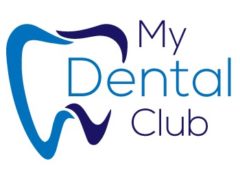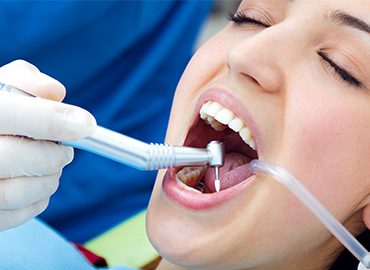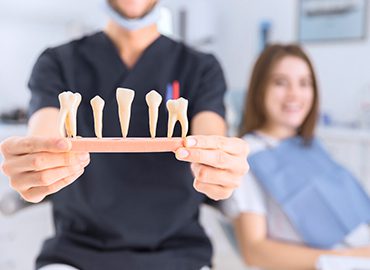June 7, 2021
Periodontal Examinations and Treatments

Gum disease, also known as periodontal disease, is a common dental problem. Plaque is like a sticky film made of food bits, germs, and spit. If you don’t clean off plaque, it becomes tartar, which can hurt your gums and bones. Taking care of your gums is super important to stop this from happening.
Guess what? Four out of five people have gum disease and don’t even know it! It doesn’t hurt much at first, so most folks don’t realize it’s there.
Scientists think gum disease might be linked to other health issues like stroke, pneumonia, diabetes, and heart problems. Even pregnant people have a higher risk. They’re figuring out if the yucky stuff from gum disease can affect these other health problems. Smoking also makes gum disease more likely.
To keep your gums healthy, remember to brush your teeth well, eat good food, and visit the dentist regularly.
Signs and Symptoms of Periodontal Disease
- Bleeding gums
- Loose teeth
- New spacing between teeth
- Bad breath.
- Pus around the teeth and gums
- Receding gums
- Red and puffy gums
- Tenderness or discomfort
Stages Of Gum Disease
Gingivitis, Periodontitis, And Advanced Periodontitis
Gum disease happens when tiny germs build up between your teeth and gums. These germs slowly attack and harm your gums. The first stage is called “gingivitis.” Luckily, at this stage, we can fix the damage to your teeth and gums with good care and cleaning.
The second stage is “periodontitis.” Some damage might be permanent, but we can stop the disease from getting worse. The last stage is “advanced periodontitis.” By this point, you might need special surgery to fix your teeth. This could mean taking out teeth and replacing them with dentures or implants.
Diagnosis
Recognizing The Symptoms Of Periodontal Disease
Why do we need Periodontal Care
Gum Disease & Your Overall Health
Gum disease can have a significant effect on your overall, systemic health. Inflammation may travel from your gums through the small blood vessels in your mouth and spread throughout your body, increasing the risk of serious health issues like heart attack and stroke. Proper oral care and periodontal treatment are required to eliminate the disease and safeguard your overall health.
Periodontal Care
With Deep Cleanings
Also called “scaling and root planning”, are typically the first step in the treatment of gingivitis and gum disease. Your dentist uses specialized dental tools to remove plaque and bacteria from between your gums and teeth. The roots of your teeth are smoothened to help remove bacteria. This prevents the formation of bacteria pockets, which attack and destroy the root of your tooth. If you notice signs and symptoms of gum disease, schedule your appointment with us today.
Maintenance of Periodontal Care
Proper Oral Hygeine
It only takes twenty four hours for plaque that is not removed from your teeth to turn into tartar! Daily home cleaning helps control plaque and tartar formation, but those hard to reach areas will always need special attention.
Once your periodontal treatment has been completed, your dentist will recommend that you have regular maintenance cleanings . Plaque and calculus that is difficult for you to remove will be removed from above and below the gum line .Depending on your situation you will require cleanings 2-4 times a year.
In addition to your periodontal cleaning and evaluation, your appointment will usually include:
- Examination and diagnostic x-rays (radiographs): essential for detection of decay, tumors, cysts, and bone loss. X-rays also help determine tooth and root positions.
- Examination of existing restorations: check current fillings, crowns, etc.
- Examination of tooth decay: check all tooth surfaces for decay.
- Oral cancer screening: check the face, neck, lips, tongue, throat, cheek tissues, and gums for any signs of oral cancer.
- Oral hygiene recommendations: review and recommend oral hygiene aids as needed.
- Teeth polishing: The dentist removes stain and plaque.
Good oral hygiene practices and having your cleanings are essential for you .



